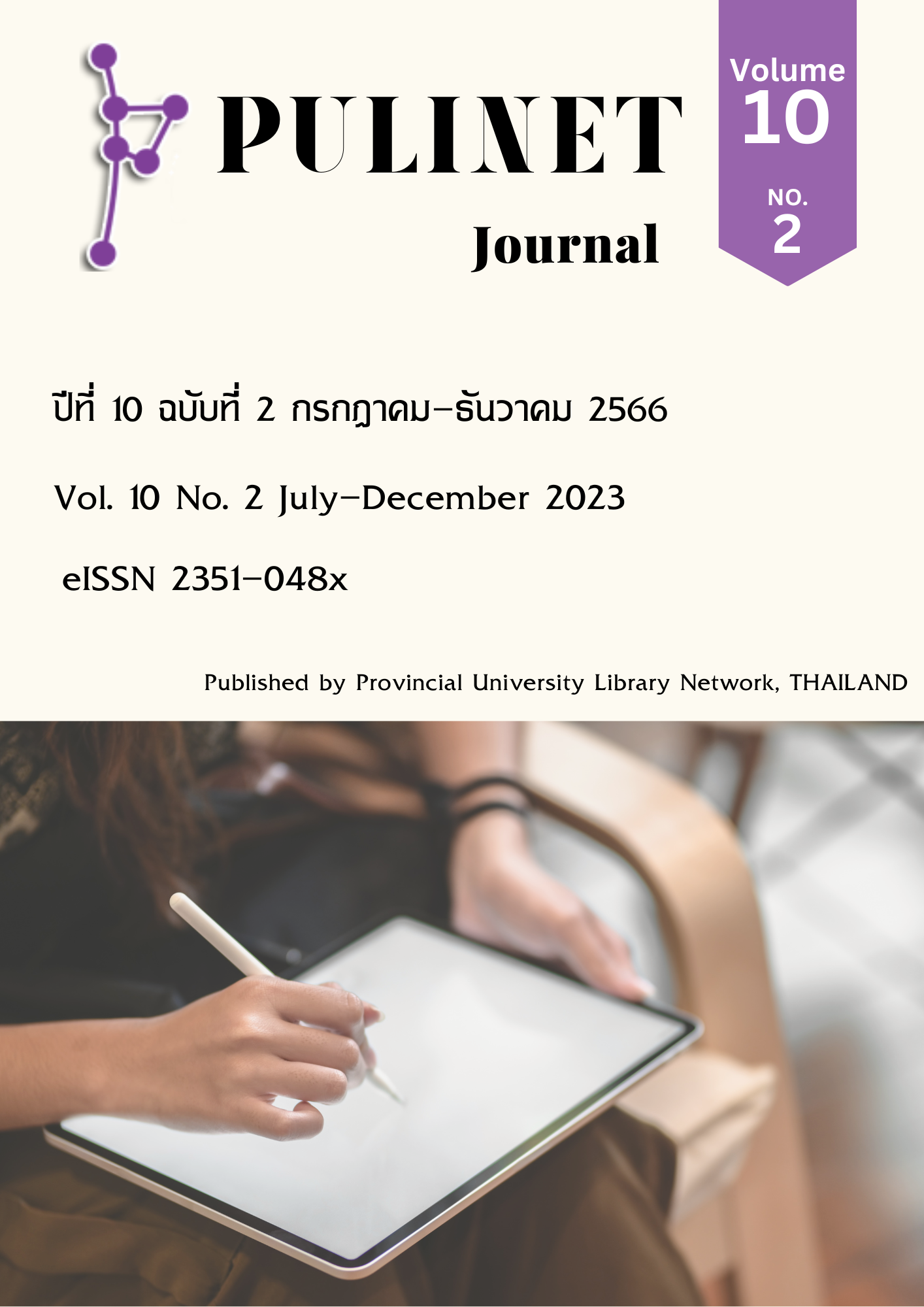การพัฒนาระบบบริหารจัดการกิจกรรมด้วยระบบ Digital ครบวงจร โดยใช้ Agile Model และ Lean Model
Main Article Content
บทคัดย่อ
การพัฒนาระบบบริหารจัดการกิจกรรม CMU Book Fair ด้วยระบบ Digital ครบวงจร พัฒนาขึ้นเพื่อเพิ่มประสิทธิภาพการปฏิบัติงานในการจัดกิจกรรม CMU Book Fair ของสำนักหอสมุด มหาวิทยาลัยเชียงใหม่ ด้วยระบบดิจิทัลแบบครบวงจร ทั้งสิ้น 6 ระบบ ได้แก่ (1) ระบบจองพื้นที่จัดจำหน่ายหนังสือ (2) ระบบจองพื้นที่จำหน่ายอาหาร (3) ระบบจำหน่ายของที่ระลึก (4) ระบบเสนอซื้อหนังสือเข้าห้องสมุด (5) ระบบจำหน่ายฉลากการกุศลสมทบทุนกองทุนพัฒนาสำนักหอสมุด และ (6) ระบบลงเวลาปฏิบัติงานนอกเวลาราชการ เพื่อรองรับการจัดกิจกรรมและปฏิบัติงานในการจัดกิจกรรม CMU Book Fair ครอบคลุมทั้ง 6 กิจกรรมหลัก โดยใช้ LEAN Model ในการลดขั้นตอนการปฏิบัติงาน และใช้ Agile Model ในการพัฒนาระบบผ่านการดำเนินงานเป็นทีมตามกิจกรรมหลัก 6 กิจกรรม เพื่อให้สามารถพัฒนาระบบได้ตรงตามความต้องการของผู้ปฏิบัติงานมากที่สุด ซึ่งระบบทั้ง 6 ระบบ จะมีความเชื่อมโยงของข้อมูลและการปฏิบัติงานที่สัมพันธ์กัน
ผลการพัฒนาระบบบริหารจัดการกิจกรรม CMU Book Fair ด้วยระบบ Digital ครบวงจร ทั้ง 6 ระบบ พบว่า การพัฒนาระบบบริหารจัดการกิจกรรมในงาน CMU Book fair ด้วยระบบ Digital ครบวงจร โดยใช้ Agile Model และกระบวนการ Lean สามารถพัฒนาระบบที่ตอบสนองต่อความต้องการของผู้ปฏิบัติงานได้และช่วยลดกระบวนการทำงานหรือระยะเวลา และจำนวนผู้ปฏิบัติงานลงได้ ทั้ง 6 กิจกรรมหลัก โดยระบบจองพื้นที่จำหน่ายอาหาร สามารถช่วยลดขั้นตอนการปฏิบัติงานได้มากที่สุด (2 ขั้นตอน) และระบบเสนอซื้อหนังสือเข้าห้องสมุด ไม่สามารถลดขั้นตอนการปฏิบัติงานลงได้ อย่างไรก็ตามการพัฒนาระบบสามารถลดระยะเวลาที่ใช้ในการดำเนินการ ทั้ง 6 กิจกรรมหลัก โดยระบบจำหน่ายฉลากการกุศลสมทบทุนกองทุนพัฒนาสำนักหอสมุดสามรถระยะเวลาได้มากที่สุด (ร้อยละ 80) และระบบจองพื้นที่จำหน่ายอาหารสามารถลดระยะเวลาได้น้อยที่สุด (ร้อยละ 25)
Article Details

อนุญาตภายใต้เงื่อนไข Creative Commons Attribution-NonCommercial-NoDerivatives 4.0 International License.
เอกสารอ้างอิง
ตุลาพล นิติเดชา. (2564). การประยุกต์ใช้แนวคิดลีนเพื่อเพิ่มประสิทธิภาพงานสนับสนุนวิชาการในสถาบันการศึกษ กรณีศึกษาคณะโลจิสติกส์ มหาวิทยาลัยบูรพา Application of Lean concept to Enhance Academic Support Work in Educational Institutions, Case Study, Faculty of Logistics Burapha University. https://dspace.lib.buu.ac.th/handle/1234567890/4487
ปิยนันท์ เสนะโห. (2563). การพัฒนาระบบสารสนเทศเพื่อการบริการของศูนย์เทคโนโลยีดิจิทัล. https://www.pbru.ac.th/pbru/wp-content/uploads/files/รวมเล่มงานวิจัยปิยนันท์.pdf
พุทธิดา สกุลวิริยกิจกุล และ มนต์ชัย เทียนทอง. (2560). การสังเคราะห์กรอบแนวคิดรูปแบบการเรียนรู้แบบโครงงานเป็นฐาน โดยใช้แนวคิดการพัฒนาซอฟต์แวร์แบบเอจายล์เพื่อเสริมทักษะการทำงานเป็นทีม. https://tdc.thailis.or.th/tdc/browse.php?option=show&browse_type=title&titleid=469972
วรรณฤดี พึ่งเฮง, และ วุฒิพงษ์ ชินศรี. (2560). A Comparison of Software Development Process Model. 136–145.
https://apheit.bu.ac.th/jounal/science-july-2560/14_14_Comparison%20of%20 Software_proof1_formatted.pdf
Neunsinger, Christoph. (2021). LEAN SYSTEMS – An Introduction to Lean Management Systems and its Business Applications. https://www.researchgate.net/publication/
Vukadinovic et al. (2017). Education for lean & lean for education: A literature review. https://www.researchgate.net/publication/


